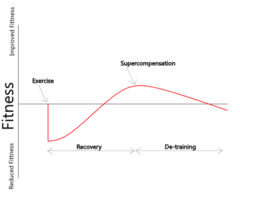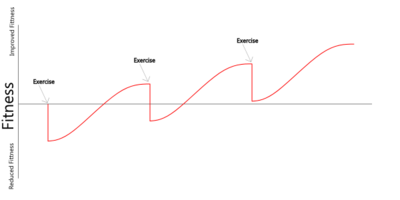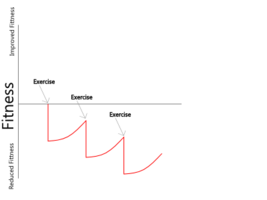Overtraining
From Fellrnr.com, Running tips
Revision as of 13:21, 6 March 2012 by User:Fellrnr (User talk:Fellrnr | contribs) (Created page with "Too much training is worse than not enough. Overtraining is a lack of recovery from training stress. The most serious type of overtra...")
Overtraining is a lack of recovery from training stress. The most serious type of overtraining is Overtraining Syndrome, but there are other categories. Each involves some imbalance between training and recovery, but with different outcomes.
- Too Much Too Soon (TMTS) is different to Overtraining Syndrome, but it is related. Too Much Too Soon is where a new training stress is increased too quickly, combined with too little recovery causing injuries, but without the impaired performance, persistent fatigue, and mood changes of Overtraining Syndrome. (Main article: Too Much Too Soon.)
- Overuse is similar to TMTS, but is where a long term imbalance between training and recovery leads to injuries. Like TMTS, overuse does not have the mood changes that are indicative of Overtraining Syndrome. With Overuse passive recovery is often insufficient. (Main article: Overuse.)
- Overload is a normal part of healthy, effective training. Overload has a short term performance decrement, but without the severe psychological and long lasting negative symptoms of Overtraining Syndrome[1]. Overload is sometimes called 'functional overreaching'. Overload can be recovered from in a few days[2].
- Overtraining Syndrome is where the imbalance between training and recovery produces a decrease in performance and negative psychological changes. The negative effects of overreaching do not produce overall performance improvements through Supercompensation. (Main article: Overtraining Syndrome.)
- Overtraining Syndrome Subtypes. There are various ways of categorizing Overtraining Syndrome. One division is based on recovery time, with recovery in two weeks or less being called 'Overreaching' (AKA non-functional overreaching[2][1] and 'Overtraining Syndrome' (OTS) requiring several weeks[2], or months[1] and sometimes years[3]. Other categorizations use the associated mental health impacts of Overtraining Syndrome.
1 Overtraining and Supercompensation
2 References
- ↑ 1.0 1.1 1.2 Prevention, diagnosis and treatment of the Overtraining Syndrome http://www.ingentaconnect.com/content/tandf/tejs/2006/00000006/00000001/art00001
- ↑ 2.0 2.1 2.2 Physiological Perspective of Endurance Overtraining – A Comprehensive Update http://ajms.alameenmedical.org/article_vol05-1-jan-mar-2012/AJMS.5.1.2012%20P%207-20.pdf
- ↑ The unknown mechanism of the overtraining syndrom... [Sports Med. 2002] - PubMed - NCBI http://www.ncbi.nlm.nih.gov/pubmed/11839081



